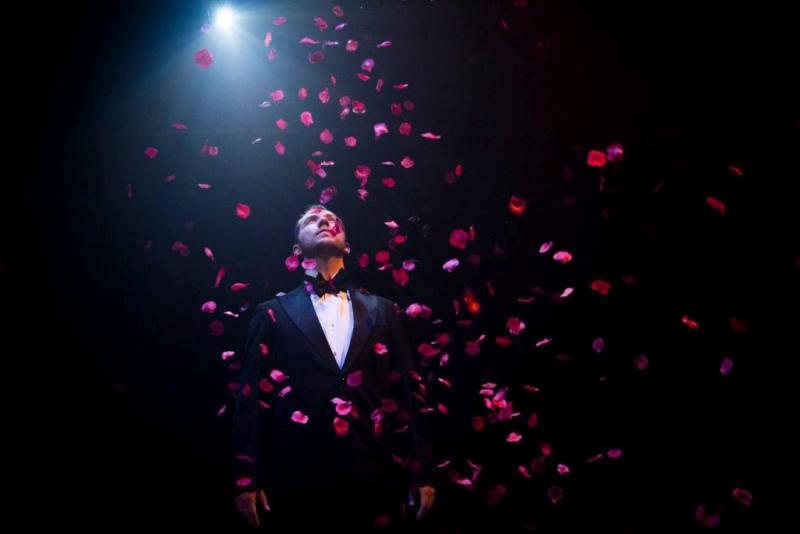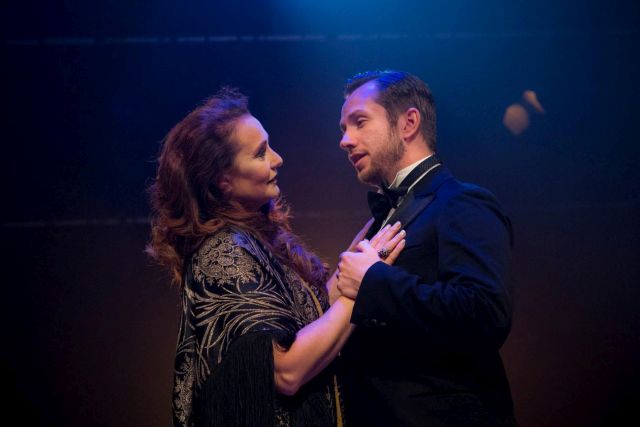Grand Hotel, Southwark Playhouse | reviews, news & interviews
Grand Hotel, Southwark Playhouse
Grand Hotel, Southwark Playhouse
Smaller is better - even best - in third London go-round of 1989 Broadway hit

Never in a million years would you guess that Grand Hotel – the 1989 New York hit now brilliantly revived at Southwark Playhouse – is one of Broadway's great rescue jobs. That something seemingly so organic, so cohesive, so intricate could have reached the final stages of production in such trouble that even a force of nature like Tony-winner Maury Yeston (Nine) must have wondered it if were salvageable simply beggars belief.
George Forrest and Robert Wright were, of course, famous for recycling other people's music and making hit songs out of hit tunes, but the changes that Yeston made, the new songs and subsequent restructuring, can be equated in my mind with Verdi's wholesale transformation of Simon Boccanegra through the addition, in large part, of a single (albeit inspired) scene. I've watched Yeston at work in the BMI Musical Theatre Advanced Workshop in New York and can vouch for his astonishing nose for what is wrong and how (if at all possible) it might be put right. Sometimes it's a tiny thing, sometimes simply a change of emphasis. You can't buy instincts like that.
And so Grand Hotel found its form, and that form – so manifest in the imperative drive of the ensembles – necessitated yoking a great choreographer to a great director (Tommy Tune combining both roles in the Broadway original, for which Tune won two Tonys) and making physical the intricate counterpointing of characters and their stories. At Southwark, the trick is never knowing where director Thom Southerland leaves off and choreographer Lee Proud steps in and vice-versa.
The seamless symbiosis between them enables us quite literally to see the complex musical counterpoint in action – the way individual narratives coalesce or impact upon each other, to make balletic the feverish comings and goings of a great hotel as it hurtles towards one of the darkest phases in its history: Berlin in the 1920s.
 With limited space and limited budget (nothing like it for concentrating the imagination) – a chequered floor, a chandelier, some chairs – Southerland and Proud quite brilliantly convey the freneticism of a race against time, of changing times, of impending catastrophe. The smell of death is always in the air. Individuals shine – producer Danielle Tarento's casting is very much on the money, with standout turns from an affecting Christine Grimandi as the fading ballerina and Scott Garnham as her impoverished nobleman-lover (the two pictured above) – but it is this mess of humankind in flux that really makes the piece sing. And the singing in this concentrated space is thrilling: such dense and often astringent counterpoint is rare in a Broadway show and definitely sets Grand Hotel apart.
With limited space and limited budget (nothing like it for concentrating the imagination) – a chequered floor, a chandelier, some chairs – Southerland and Proud quite brilliantly convey the freneticism of a race against time, of changing times, of impending catastrophe. The smell of death is always in the air. Individuals shine – producer Danielle Tarento's casting is very much on the money, with standout turns from an affecting Christine Grimandi as the fading ballerina and Scott Garnham as her impoverished nobleman-lover (the two pictured above) – but it is this mess of humankind in flux that really makes the piece sing. And the singing in this concentrated space is thrilling: such dense and often astringent counterpoint is rare in a Broadway show and definitely sets Grand Hotel apart.
There are the inevitable echoes of Kander and Ebb's Cabaret, and Southerland pulls off an absolutely chilling dénouement where the shape of things to come is brought horribly into focus and we the audience are suddenly, unwittingly, complicit. I didn't see that coming.
rating
Buy
Share this article
The future of Arts Journalism
You can stop theartsdesk.com closing!
We urgently need financing to survive. Our fundraising drive has thus far raised £49,000 but we need to reach £100,000 or we will be forced to close. Please contribute here: https://gofund.me/c3f6033d
And if you can forward this information to anyone who might assist, we’d be grateful.

Subscribe to theartsdesk.com
Thank you for continuing to read our work on theartsdesk.com. For unlimited access to every article in its entirety, including our archive of more than 15,000 pieces, we're asking for £5 per month or £40 per year. We feel it's a very good deal, and hope you do too.
To take a subscription now simply click here.
And if you're looking for that extra gift for a friend or family member, why not treat them to a theartsdesk.com gift subscription?
more Theatre
 Punch, Apollo Theatre review - powerful play about the strength of redemption
James Graham's play transfixes the audience at every stage
Punch, Apollo Theatre review - powerful play about the strength of redemption
James Graham's play transfixes the audience at every stage
 The Billionaire Inside Your Head, Hampstead Theatre review - a map of a man with OCD
Will Lord's promising debut burdens a fine cast with too much dialogue
The Billionaire Inside Your Head, Hampstead Theatre review - a map of a man with OCD
Will Lord's promising debut burdens a fine cast with too much dialogue
 50 First Dates: The Musical, The Other Palace review - romcom turned musical
Date movie about repeating dates inspires date musical
50 First Dates: The Musical, The Other Palace review - romcom turned musical
Date movie about repeating dates inspires date musical
 Bacchae, National Theatre review - cheeky, uneven version of Euripides' tragedy
Indhu Rubasingham's tenure gets off to a bold, comic start
Bacchae, National Theatre review - cheeky, uneven version of Euripides' tragedy
Indhu Rubasingham's tenure gets off to a bold, comic start
 The Harder They Come, Stratford East review - still packs a punch, half a century on
Natey Jones and Madeline Charlemagne lead a perfectly realised adaptation of the seminal movie
The Harder They Come, Stratford East review - still packs a punch, half a century on
Natey Jones and Madeline Charlemagne lead a perfectly realised adaptation of the seminal movie
 The Weir, Harold Pinter Theatre review - evasive fantasy, bleak truth and possible community
Three outstanding performances in Conor McPherson’s atmospheric five-hander
The Weir, Harold Pinter Theatre review - evasive fantasy, bleak truth and possible community
Three outstanding performances in Conor McPherson’s atmospheric five-hander
 Dracula, Lyric Hammersmith review - hit-and-miss recasting of the familiar story as feminist diatribe
Morgan Lloyd Malcolm's version puts Mina Harkness centre-stage
Dracula, Lyric Hammersmith review - hit-and-miss recasting of the familiar story as feminist diatribe
Morgan Lloyd Malcolm's version puts Mina Harkness centre-stage
 Reunion, Kiln Theatre review - a stormy night in every sense
Beautifully acted, but desperately grim drama
Reunion, Kiln Theatre review - a stormy night in every sense
Beautifully acted, but desperately grim drama
 The Code, Southwark Playhouse Elephant review - superbly cast, resonant play about the price of fame in Hollywood
Tracie Bennett is outstanding as a ribald, riotous Tallulah Bankhead
The Code, Southwark Playhouse Elephant review - superbly cast, resonant play about the price of fame in Hollywood
Tracie Bennett is outstanding as a ribald, riotous Tallulah Bankhead
 The Lady from the Sea, Bridge Theatre review - flashes of brilliance
Simon Stone refashions Ibsen in his own high-octane image
The Lady from the Sea, Bridge Theatre review - flashes of brilliance
Simon Stone refashions Ibsen in his own high-octane image

Add comment